
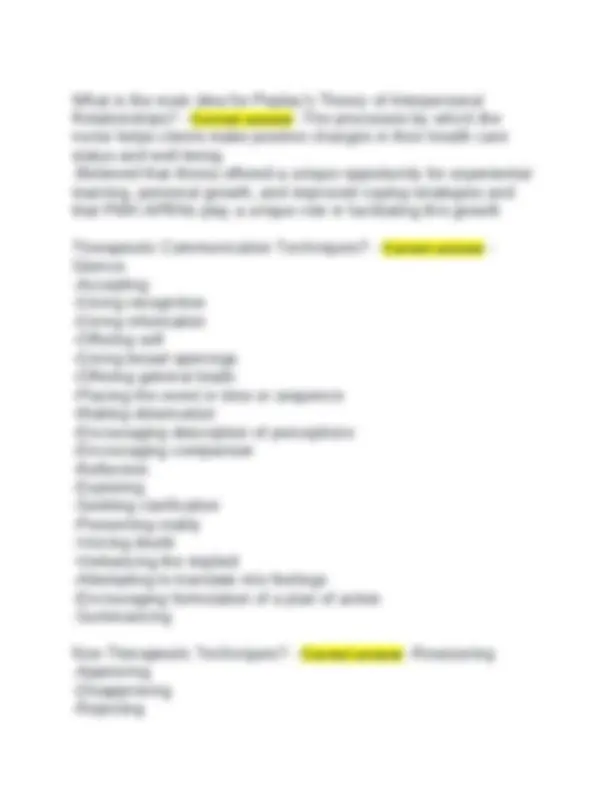
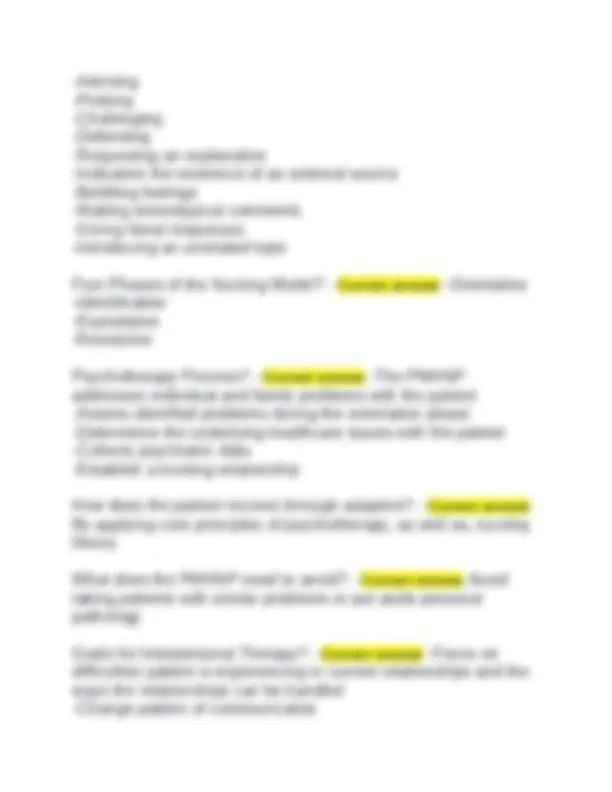
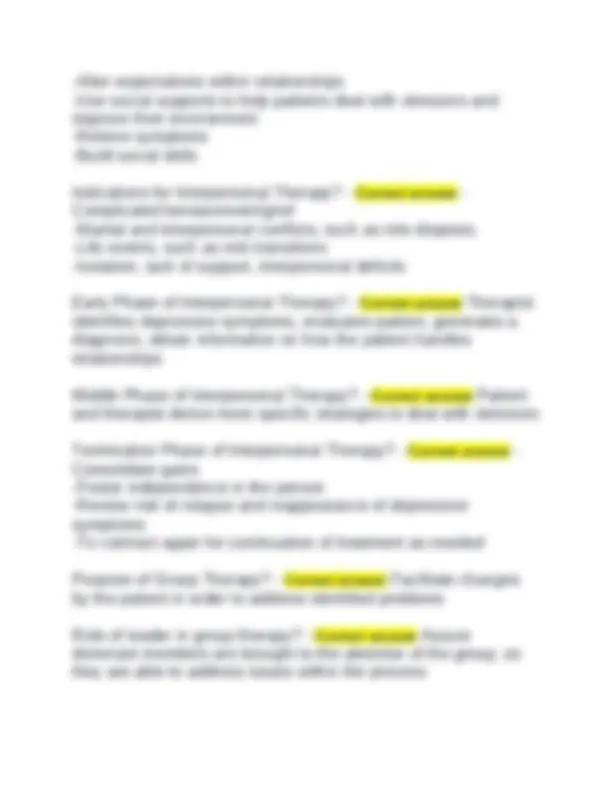
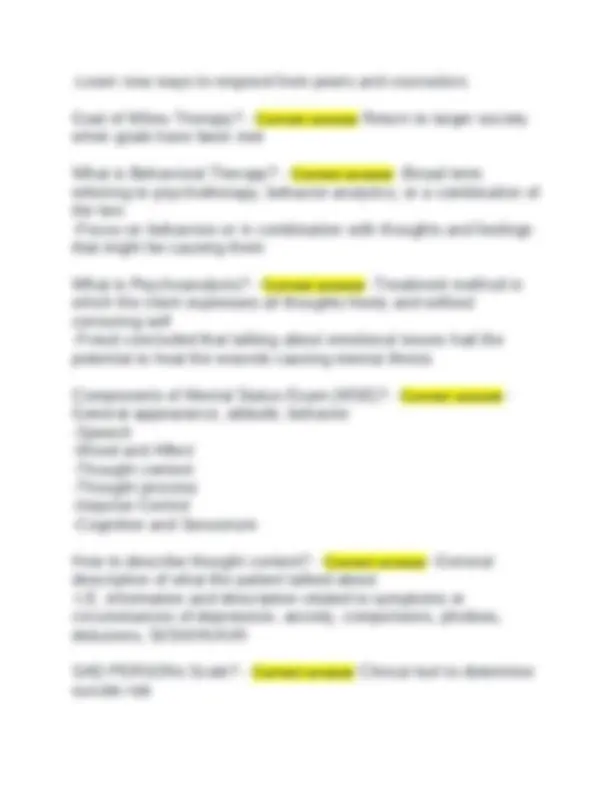
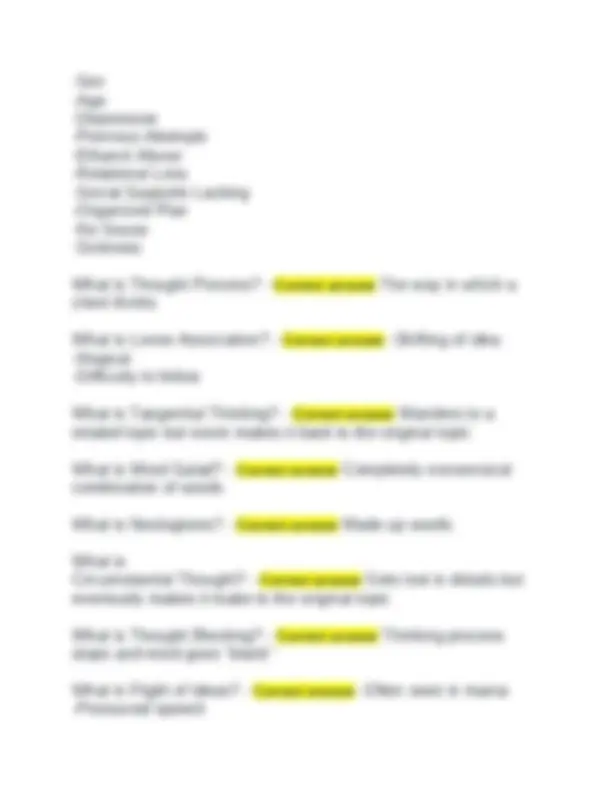
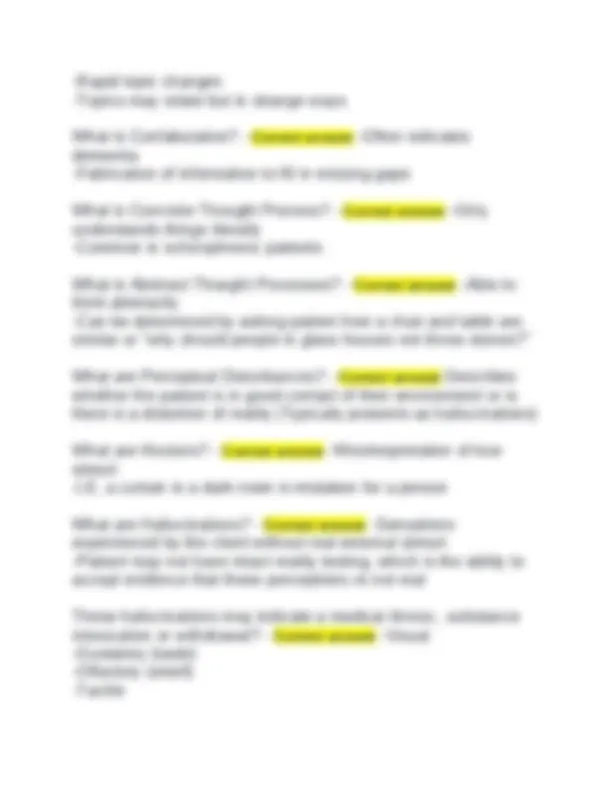
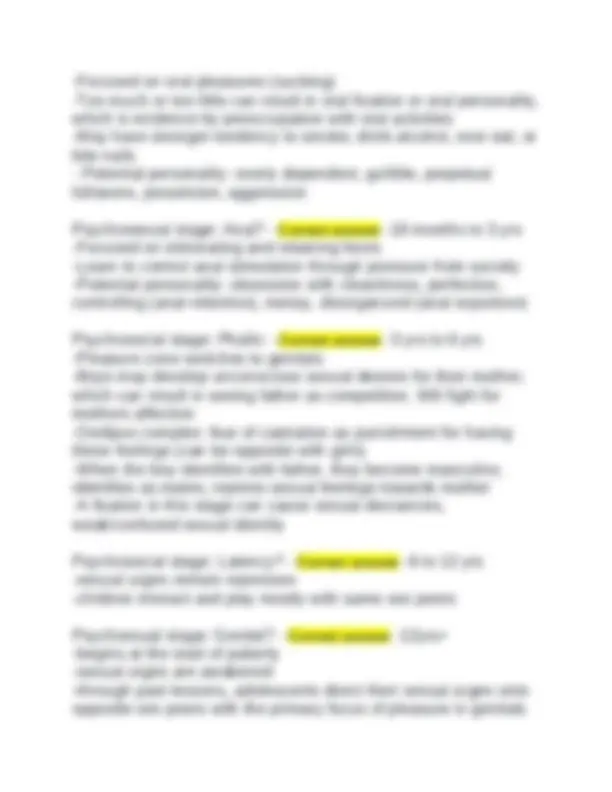
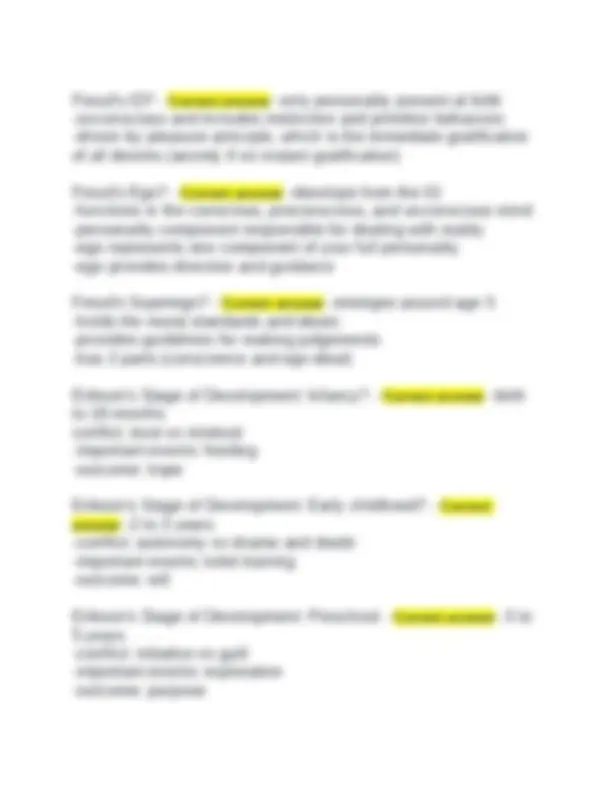
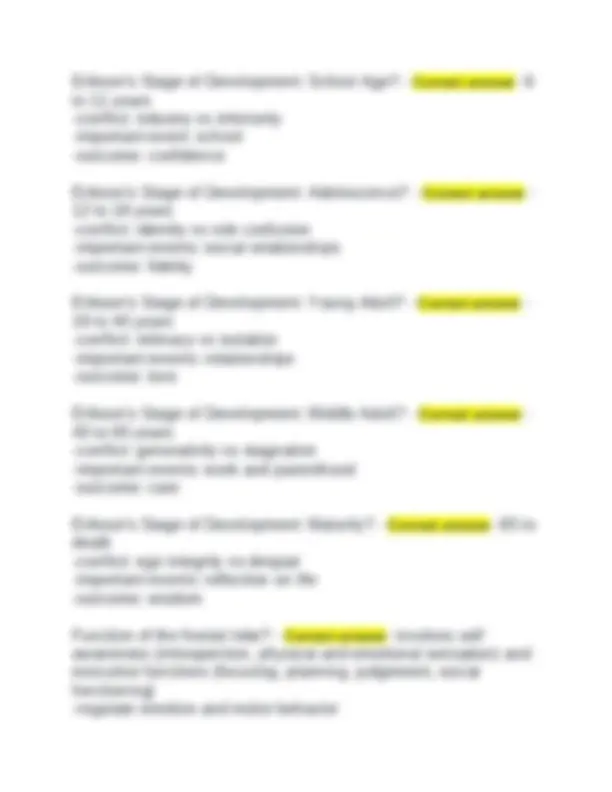
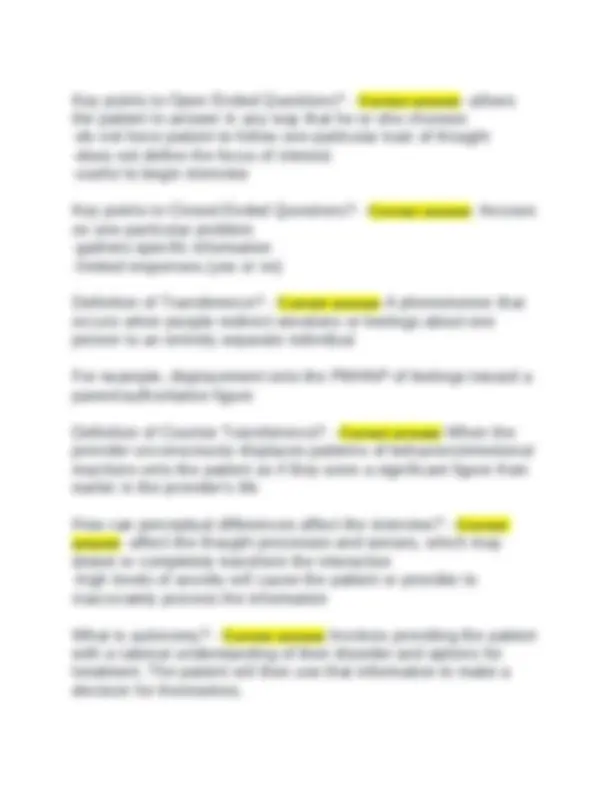
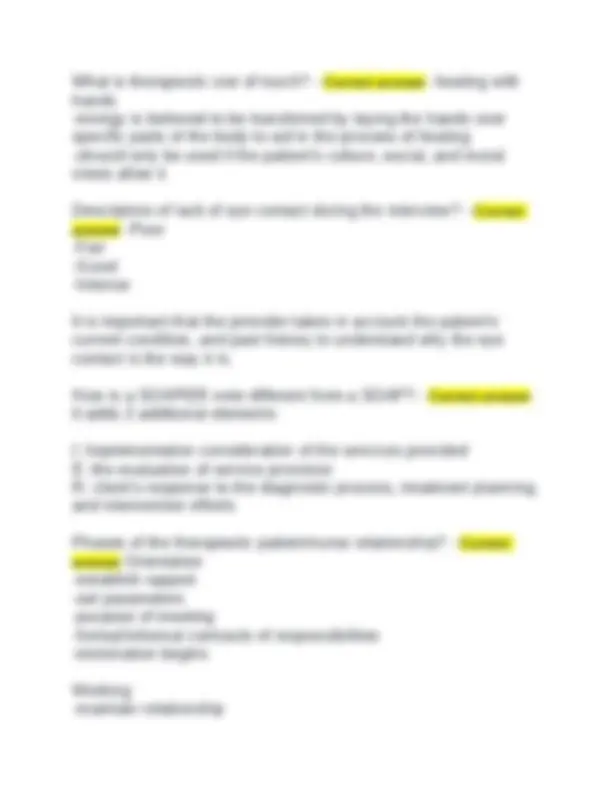
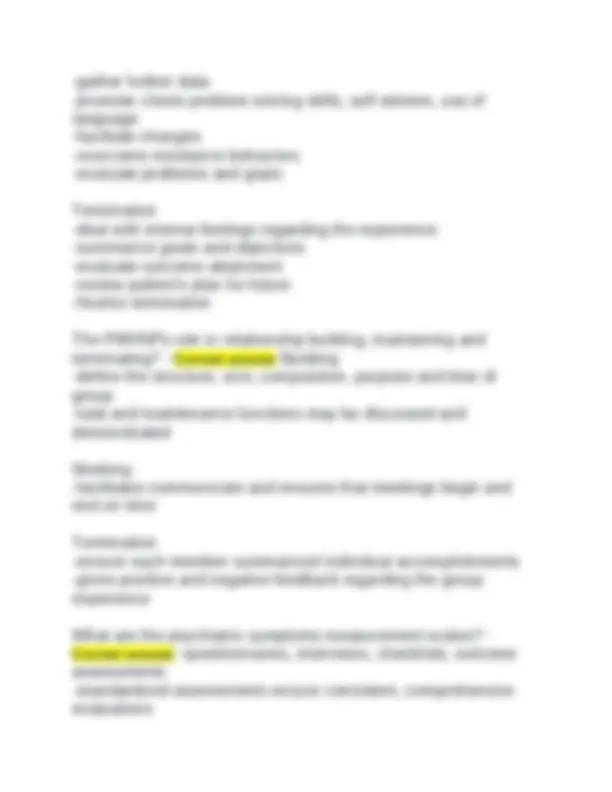
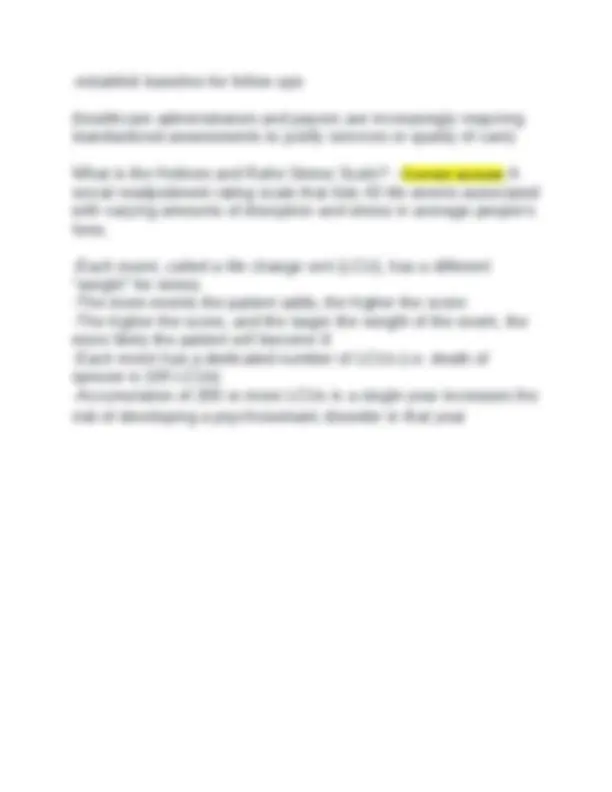


Study with the several resources on Docsity

Earn points by helping other students or get them with a premium plan


Prepare for your exams
Study with the several resources on Docsity

Earn points to download
Earn points by helping other students or get them with a premium plan
Community
Ask the community for help and clear up your study doubts
Discover the best universities in your country according to Docsity users
Free resources
Download our free guides on studying techniques, anxiety management strategies, and thesis advice from Docsity tutors
NSG 526 Exam 1 Questions And Answers 2025 Update. NSG 526 Exam 1 Questions And Answers 2025 Update.
Typology: Exams
1 / 21

This page cannot be seen from the preview
Don't miss anything!














What is not considered a mental disorder? - Correct answer -An expectable or culturally approved response to a common stressor or loss, such as the death of a loved one -Socially deviant behavior (i.e. political, religious, or sexual) and conflicts that are primarily between the individual and society (unless the behaviors are due to a dysfunction) What is considered a mental disorder per the DSM5? - Correct answer -Associated with significant distress or disability in social, occupation, or other important activities -Significant disturbance in cognition, emotion regulation, or behavior that reflects a dysfunction in the psychological, biological or developmental processes underlying mental functioning Purpose of Scope of Practice? - Correct answer -Define NP roles -Identify competencies assumed to be held by all NPs who function in a particular role -Varies broadly from state to state Purpose of Standard of Practice? - Correct answer -Authoritative statements regarding the quality and type of practice that should be provided -Provide a way to judge the nature of care provided -Reflect the expectation for the care that should be provided to clients with various illnesses -Reflect professional agreement focused on the minimum levels of acceptable performance -Can be used to legally describe the standard of care that must be met by a provider
-May be precise protocols that must be followed or more general guidelines that recommend actions Purpose of Psychiatric Interview? - Correct answer Understand the patient's illness to evaluate the effect on their lives and create a beginning diagnosis and treatment plan What is a Therapeutic Alliance? - Correct answer -Create a relationship with client by being calming, warm, understanding, kind, respectful, concerned and focused -Able to help patient better if a therapeutic alliance was formed Important components of a therapeutic alliance? - Correct answer - Therapist and patient work collaboratively to create therapeutic change through an affectionate bond -Agreement on goals of therapy -The therapist's ability to be empathetic and involved in therapy -The ability of the patient to do the work of therapy What is Psychotherapy? - Correct answer Holistic treatment that relies on the nurse's processing of that the patient is experiencing Peplau's most universal contribution to PMHNPs? - Correct answer -Her application of Sullivan's theory of anxiety to nursing practice -Described the effects of different levels of anxiety (mild, moderate, severe, and panic) on perception and learning -Promoted interventions to lower anxiety, with the aim of improving clients' abilities to think and function at more satisfactory levels Per Peplau, skills of a MH nurse? - Correct answer -Observation, interpretation, and intervention (The PMHNP observes and listens to the client, developing impressions about the client's situation)
-Advising -Probing -Challenging -Defending -Requesting an explanation -Indication the existence of an external source -Belittling feelings -Making stereotypical comments -Giving literal responses -Introducing an unrelated topic Four Phases of the Nursing Model? - Correct answer -Orientation -Identification -Exploitation -Resolution Psychotherapy Process? - Correct answer -The PMHNP addresses individual and family problems with the patient -Assess identified problems during the orientation phase -Determines the underlying healthcare issues with the patient -Collects psychiatric data -Establish a trusting relationship How does the patient recover through adaption? - Correct answer By applying core principles of psychotherapy, as well as, nursing theory What does the PMHNP need to avoid? - Correct answer Avoid taking patients with similar problems or put aside personal pathology Goals for Interpersonal Therapy? - Correct answer -Focus on difficulties patient is experiencing in current relationships and the ways the relationships can be handled -Change pattern of communication
-Alter expectations within relationships -Use social supports to help patients deal with stressors and improve their environment -Relieve symptoms -Build social skills Indications for Interpersonal Therapy? - Correct answer - Complicated bereavement/grief -Marital and interpersonal conflicts, such as role disputes -Life events, such as role transitions -Isolation, lack of support, interpersonal deficits Early Phase of Interpersonal Therapy? - Correct answer Therapist identifies depressive symptoms, evaluates patient, generates a diagnosis, obtain information on how the patient handles relationships Middle Phase of Interpersonal Therapy? - Correct answer Patient and therapist derive more specific strategies to deal with stressors Termination Phase of Interpersonal Therapy? - Correct answer - Consolidate gains -Foster independence in the person -Review risk of relapse and reappearance of depressive symptoms -To contract again for continuation of treatment as needed Purpose of Group Therapy? - Correct answer Facilitate changes by the patient in order to address identified problems Role of leader in group therapy? - Correct answer Assure dominant members are brought to the attention of the group, so they are able to address issues within the process
Characteristic of Infancy? - Correct answer Gratification of needs Characteristic of Childhood? - Correct answer Delayed gratification Characteristic of Juvenile? - Correct answer Formation of peer group Characteristic of Preadolescence? - Correct answer Developing relationships within same gender Characteristic of Early Adolescence? - Correct answer Identity Characteristic of Late Adolescence? - Correct answer Forming lasting and intimate relationships What are the 3 types of self? - Correct answer -Good me vs Bad me: based on social appraisal and the anxiety that results from negative feedback -Not me: unknown, repressed component of self How does Sullivan's theory define security operation? - Correct answer Measures that the individual employs to reduce anxiety and enhance security How does Sullivan's theory define self system? - Correct answer All of the security operations that an individual uses to defend against anxiety and ensure self-esteem What is Milieu Therapy? - Correct answer -Significant time spent in a home-like environment -Interact with similar individuals -Conduct different activities throughout the day -May attend group or individual therapy sessions -Establish treatment goals for themselves and community
-Learn new ways to respond from peers and counselors Goal of Milieu Therapy? - Correct answer Return to larger society when goals have been met What is Behavioral Therapy? - Correct answer -Broad term referring to psychotherapy, behavior analytics, or a combination of the two -Focus on behaviors or in combination with thoughts and feelings that might be causing them What is Psychoanalysis? - Correct answer -Treatment method in which the client expresses all thoughts freely and without censoring self -Freud concluded that talking about emotional issues had the potential to heal the wounds causing mental illness Components of Mental Status Exam (MSE)? - Correct answer - General appearance, attitude, behavior -Speech -Mood and Affect -Thought content -Thought process -Impulse Control -Cognition and Sensorium How to describe thought content? - Correct answer -General description of what the patient talked about -I.E. information and description related to symptoms or circumstances of depression, anxiety, compulsions, phobias, delusions, SI/SH/HI/AVH SAD PERSONs Scale? - Correct answer Clinical tool to determine suicide risk
-Rapid topic changes -Topics may relate but in strange ways What is Confabulation? - Correct answer -Often indicates dementia -Fabrication of information to fill in missing gaps What is Concrete Thought Process? - Correct answer -Only understands things literally -Common in schizophrenic patients What is Abstract Thought Processes? - Correct answer -Able to think abstractly -Can be determined by asking patient how a chair and table are similar or "why should people in glass houses not throw stones?" What are Perceptual Disturbances? - Correct answer Describes whether the patient is in good contact of their environment or is there is a distortion of reality (Typically presents as hallucinations) What are Illusions? - Correct answer -Misinterpretation of true stimuli -I.E. a curtain in a dark room is mistaken for a person What are Hallucinations? - Correct answer -Sensations experienced by the client without real external stimuli -Patient may not have intact reality testing, which is the ability to accept evidence that these perceptions re not real These hallucinations may indicate a medical illness , substance intoxication or withdrawal? - Correct answer -Visual -Gustatory (taste) -Olfactory (smell) -Tactile
What are Hypnagogic and Hypnopompic Hallucinations? - Correct answer False sensory perceptions that occur while falling asleep and while awakening from sleep Ways to test Cognition and Abstraction? - Correct answer - Sensorium can be obtained while observing patient during the evaluation -Memory can be tested by having the patient remember and repeat 3 objects -Concentration can be tested by counting backwards from 100 by 7s DSM-5 Axis 1? - Correct answer Clinical disorders -does not include personality disorders or mental retardation DSM-5 Axis 2? - Correct answer Personality Disorders and Mental Retardation DSM-5 Axis 3? - Correct answer General Medical Conditions (medical issues that causes the mental disorder) DSM-5 Axis 4 - Correct answer Psychosocial and environmental problems DSM-5 Axis 5 - Correct answer Global Assessment of Functioning (GAF) What is GAF? - Correct answer -Scoring system that is used to assess how well an individual is functioning in their daily lives -Scores range from 0 to 100 GAF Scoring System? - Correct answer 100 - no symptoms 90 - minimal symptoms with good functioning 80 - transient symptoms that are expected reactions to psychosocial stressors
-Focused on oral pleasures (sucking) -Too much or too little can result in oral fixation or oral personality, which is evidence by preoccupation with oral activities -May have stronger tendency to smoke, drink alcohol, over eat, or bite nails
Freud's ID? - Correct answer -only personality present at birth -unconscious and includes instinctive and primitive behaviors -driven by pleasure principle, which is the immediate gratification of all desires (anxiety if no instant gratification) Freud's Ego? - Correct answer -develops from the ID -functions in the conscious, preconscious, and unconscious mind -personality component responsible for dealing with reality -ego represents one component of your full personality -ego provides direction and guidance Freud's Superego? - Correct answer -emerges around age 5 -holds the moral standards and ideals -provides guidelines for making judgements -has 2 parts (conscience and ego ideal) Erikson's Stage of Development: Infancy? - Correct answer -birth to 18 months conflict: trust vs mistrust -important events: feeding -outcome: hope Erikson's Stage of Development: Early childhood? - Correct answer -2 to 3 years -conflict: autonomy vs shame and doubt -important events: toilet training -outcome: will Erikson's Stage of Development: Preschool - Correct answer -3 to 5 years -conflict: initiative vs guilt -important events: exploration -outcome: purpose
-associated with schizophrenia, attention disorders, OCD, mood disorders Function of Parietal lobe? - Correct answer -coordination of sensation and motor behavior (coordination of language functions) -spatial orientation (knowing where your body is, physical sensation) -recognition of people and objects Function of temporal lobe? - Correct answer -memory formation: language (Wernicke's area) and learning -associated with euphoria, auditory hallucinations, and delusions (impaired left lobe) -right lobe impairment: dysphoria, depression, irritability, inappropriate affect Function of Occipital lobe? - Correct answer -vision and visual memory -impairment can cause visual defects, blindness and visual hallucinations What is case formulation? - Correct answer -used in treatment planning to justify a level of care, specify treatment needs, provide rationale for legal adjudication, immediate safety measures and ensure reasonable cost containment -hypothesis about the causes, precipitants and maintaining influence of a person's psychological, interpersonal, and behavioral problems -description of chief features 5 Broad Categories of Case Formulation? - Correct answer 1. Symptoms and problems
What is therapeutic use of touch? - Correct answer -healing with hands -energy is believed to be transferred by laying the hands over specific parts of the body to aid in the process of healing -should only be used if the patient's culture, social, and moral views allow it Descriptors of lack of eye contact during the interview? - Correct answer -Poor -Fair -Good -Intense It is important that the provider takes in account the patient's current condition, and past history to understand why the eye contact is the way it is. How is a SOAPIER note different from a SOAP? - Correct answer It adds 2 additional elements I: Implementation consideration of the services provided E: the evaluation of service provision R: client's response to the diagnostic process, treatment planning, and intervention efforts Phases of the therapeutic patient/nurse relationship? - Correct answer Orientation -establish rapport -set parameters -purpose of meeting -formal/informal contracts of responsibilities -termination begins Working -maintain relationship
-gather further data -promote clients problem solving skills, self esteem, use of language -facilitate changes -overcome resistance behaviors -evaluate problems and goals Termination -deal with intense feelings regarding the experience -summarize goals and objectives -evaluate outcome attainment -review patient's plan for future -finalize termination The PMHNPs role in relationship building, maintaining and terminating? - Correct answer Building -define the structure, size, composition, purpose and time of group -task and maintenance functions may be discussed and demonstrated Working -facilitates communicate and ensures that meetings begin and end on time Termination -ensure each member summarized individual accomplishments -gives positive and negative feedback regarding the group experience What are the psychiatric symptoms measurement scales? - Correct answer -questionnaires, interviews, checklists, outcome assessments -standardized assessments ensure consistent, comprehensive evaluations